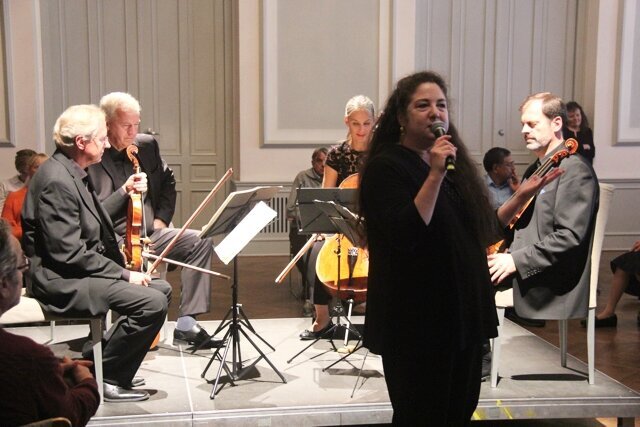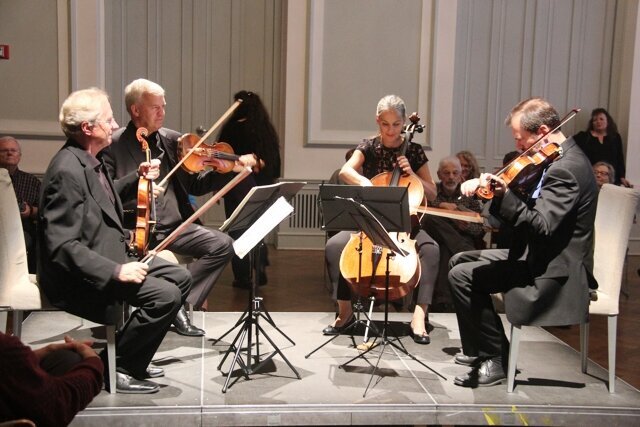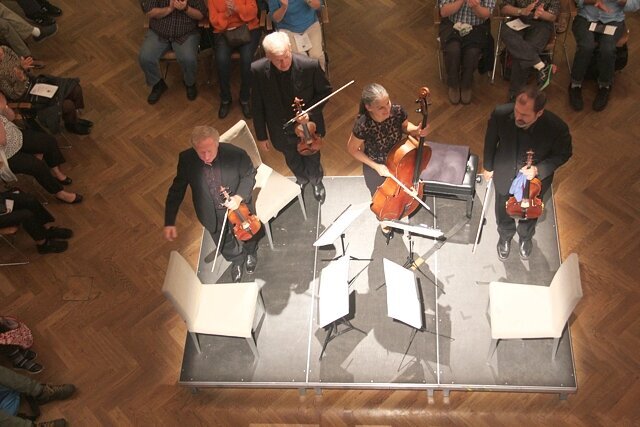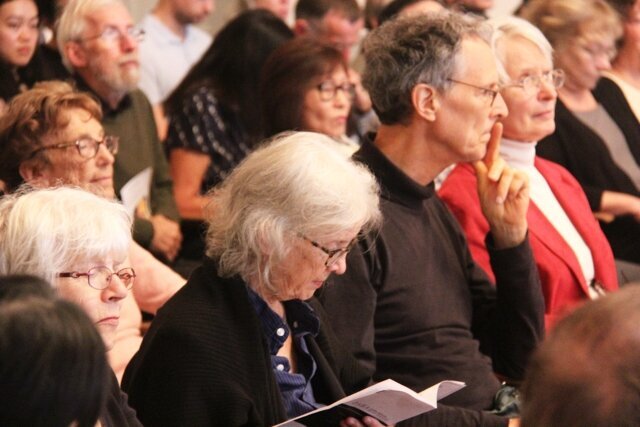From DAHA’s Archive: View the brilliant Martinů Quartet from Prague performing Antonín Dvořák’s “American” String Quartet, composed during his idyllic midwestern sojourn in the summer of 1893. This event was the third annual concert in DAHA’s continuing series of Dvořák’s complete chamber works. In the Grand Ballroom of the historic Bohemian National Hall, the renowned musicians and their audience enjoyed the enhanced acoustics and intimacy created by a central seating arrangement.
Originally performed on September 23, 2018, Martinů Quartet
Join our mailing list to receive streaming details on the day of this event.
This program will be available for repeat viewing on our YouTube Channel.
Biography
Acclaimed by audiences around the world, the Martinů Quartet appears regularly at the Prague Spring Festival as well as concerts in many European countries, the United States, Canada and Japan. Formed in 1976 at the Prague Conservatory, the chamber music group (formerly Havlák Quartet) has earned prizes at the ARD Munich, Evian, Yehudi Menuhin, and Prague Spring competitions.
Martinů Quartet
Lubomír Havlák, 1st violin
Libor Kaňka, 2nd violin
Zbyněk Paďourek, viola
Jitka Vlašánková, cello
Program Notes:
String Quartet No. 12 in F Major Opus 96, the “American”
Allegro ma non troppo
Lento
Molto vivace
Finale: vivace ma non troppo
Dvořák composed the String Quartet No. 12 in F Major Opus 96, the “American” during a summer vacation while director (1892–1895) of the National Conservatory of Music of America in New York City. He spent his vacation in the town of Spillville, Iowa, which was home to a Czech immigrant community. Dvořák had come to Spillville at the suggestion of Josef Kovařík, a young American of Czech descent who had finished violin studies at the Prague Conservatory and was about to return to Spillville, his home in the United States, when Dvořák offered him a position as secretary. Kovařík accepted the job and told Dvořák about Spillville, where his father Jan was a schoolmaster, which led to Dvořák’s decision to spend the summer of 1893 there. In that environment, and surrounded by nature, Dvořák felt very much at ease. Writing to a friend he described his state of mind, away from hectic New York: "I have been on vacation since 3 June here in the Czech village of Spillville and I won’t be returning to New York until the latter half of September. The children arrived safely from Europe and we’re all happy together. We like it very much here and, thank God, I am working hard and I’m healthy and in good spirits."
In the “American” String Quartet, Dvořák utilizes compositional elements such as pentatonic scales, melodic shapes inspired by bird calls, and rhythms inspired by the music of the Native Americans, which give this piece a distinctly American sound. The sketch for the work was completed in record time of just three days and the actual score in nine days. Though seemingly effortless, the composition took great skill and creative effort. In the Scherzo one hears the song of a bird Dvořák had not known before - The Scarlet Tanager. The Finale suggests a country Sunday, with village dance and sounds of a church organ, which Dvořák himself liked to play.
For more from the Martinů Quartet, view the September 23, 2018 performance of Dvořák’s Terzetto in C Major, Opus 74, for two violins and viola, composed in Bohemia in 1887 HERE.
Dvořák: The Chamber Music Survey organized by Laura Jean Goldberg, violinist and DAHA Board Member.
Supported by Bohemian Benevolent & Literary Association (BBLA).




